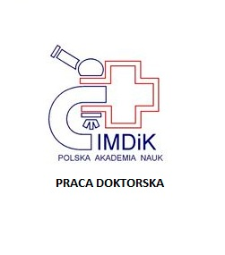- Search in all Repository
- Literature and maps
- Archeology
- Mills database
- Natural sciences
Advanced search
Advanced search
Advanced search
Advanced search
Advanced search

Object
Title: Wpływ długotrwałego pobudzenia receptora NMDA w hodowanych astrocytach mysich na wybrane białka astrocytarne
Contributor:
Albrecht, Jan ( Promotor)
Publisher:
Instytut Medycyny Doświadczalnej i Klinicznej im. M. Mossakowskiego, PAN
Place of publishing:
Description:
Bibliografia zawiera 477 pozycji ; [6], 112 s.: il., wykr., fotogr. ; 24 cm
Degree name:
Level of degree:
Degree discipline :
Degree grantor:
Mossakowski Medical Research Center PAS
Abstract:
The role of astrocytic NMDAR in the brain physiology and pathology has only begun to be understood. The results of this dissertation demonstrate that the short-term treatment of NMDA caused an increase of intracellular Ca2+ concentration in astrocytes in a way involving NMDA interaction with NMDAR, because the response was blocked by the receptor channel blocker , MK801, and it did not occur in cells with a silenced GluN1 subunit. For the first time , we have shown that NMDA causes an increase of [3H]-MK 801 binding in cultured astrocytes, an effect that can only occur if that receptor has been preactivated. Immunocytochemical analysis confirmed the presence of the GluN1 subunit of NMDAR and revealed its membrane localization in astrocytes, moreover use of specific siRNA for the GluN1 subunit warranted the soecificity oh the obtained result. Additionally, expression of the GluN1 subunit at the protein level was affirmed by Western blot analysis. The long-term exposure of astrocytes to NMDA decreased the expression of three astrolia-specific proteins-glutamine synthetase (GS), aquaporin 4 (AQP4) and Kir4.1. Moreover, downregulation of GS expression was translatedof to the decreased enzyme activity. The abolition of the NMDA-induced changes by silencing the GluN1subunit of NMDAR positively verified the dependence of the changes on specific interaction of NMDA with NMDAR. The dependence of the decrease of GS, AQP4 and Kir4.1 content on the presence of calcium in the incubation medium, indicated that this effect was induced by the ionotropic mechanisms. Moreover , tt has been demonstrates that the mechanisms of regulation by NMDAR differs for astroglia-specific proteins; NMDA treatment increased expression of GLAST mRNA without affecting the ability of astrocytes to D-aspatate uptake (an unmetabolisable Glu analogue). The fact long-term exposure of astrocytes in vitro to NMDA decreased the expression of three astrocytic proteins, critical in maintaining of ion (Kir4.1), water (AQP4) homeostasis and the balance of neurotransmitters (GS), documented the participation of astrocytic NMDAR in the response of astrocytes to the excitotoxic signal.
Relation:
Detailed Resource Type:
Resource Identifier:
Source:
IMDiK PAN, call no. ZS 399 ; click here to follow the link
Language:
Language of abstract:
Rights:
Creative Commons Attribution BY 4.0 license
Terms of use:
Copyright-protected material. [CC BY 4.0] May be used within the scope specified in Creative Commons Attribution BY 4.0 license, full text available at: ; -
Digitizing institution:
Mossakowski Medical Research Institute PAS
Original in:
Library of the Mossakowski Medical Research Institute PAS
Projects co-financed by:
Access:
Object collections:
- Digital Repository of Scientific Institutes > Partners' collections > Mossakowski Medical Research Institute PAS > Theses > Ph.D Dissertationes
- Digital Repository of Scientific Institutes > Literature > Thesis
Last modified:
Jan 5, 2023
In our library since:
Oct 30, 2019
Number of object content downloads / hits:
678
All available object's versions:
https://rcin.org.pl./publication/108921
Show description in RDF format:
Show description in RDFa format:
Show description in OAI-PMH format:
Objects Similar
Łazarewicz, Jerzy W. Salińska, Elżbieta
Kraśnicka, Zuzanna Albrecht, Jan Mossakowski, Mirosław Jan (1929–2001)
Skowrońska, Marta

 INSTYTUT ARCHEOLOGII I ETNOLOGII POLSKIEJ AKADEMII NAUK
INSTYTUT ARCHEOLOGII I ETNOLOGII POLSKIEJ AKADEMII NAUK
 INSTYTUT BADAŃ LITERACKICH POLSKIEJ AKADEMII NAUK
INSTYTUT BADAŃ LITERACKICH POLSKIEJ AKADEMII NAUK
 INSTYTUT BADAWCZY LEŚNICTWA
INSTYTUT BADAWCZY LEŚNICTWA
 INSTYTUT BIOLOGII DOŚWIADCZALNEJ IM. MARCELEGO NENCKIEGO POLSKIEJ AKADEMII NAUK
INSTYTUT BIOLOGII DOŚWIADCZALNEJ IM. MARCELEGO NENCKIEGO POLSKIEJ AKADEMII NAUK
 INSTYTUT BIOLOGII SSAKÓW POLSKIEJ AKADEMII NAUK
INSTYTUT BIOLOGII SSAKÓW POLSKIEJ AKADEMII NAUK
 INSTYTUT CHEMII FIZYCZNEJ PAN
INSTYTUT CHEMII FIZYCZNEJ PAN
 INSTYTUT CHEMII ORGANICZNEJ PAN
INSTYTUT CHEMII ORGANICZNEJ PAN
 INSTYTUT FILOZOFII I SOCJOLOGII PAN
INSTYTUT FILOZOFII I SOCJOLOGII PAN
 INSTYTUT GEOGRAFII I PRZESTRZENNEGO ZAGOSPODAROWANIA PAN
INSTYTUT GEOGRAFII I PRZESTRZENNEGO ZAGOSPODAROWANIA PAN
 INSTYTUT HISTORII im. TADEUSZA MANTEUFFLA POLSKIEJ AKADEMII NAUK
INSTYTUT HISTORII im. TADEUSZA MANTEUFFLA POLSKIEJ AKADEMII NAUK
 INSTYTUT JĘZYKA POLSKIEGO POLSKIEJ AKADEMII NAUK
INSTYTUT JĘZYKA POLSKIEGO POLSKIEJ AKADEMII NAUK
 INSTYTUT MATEMATYCZNY PAN
INSTYTUT MATEMATYCZNY PAN
 INSTYTUT MEDYCYNY DOŚWIADCZALNEJ I KLINICZNEJ IM.MIROSŁAWA MOSSAKOWSKIEGO POLSKIEJ AKADEMII NAUK
INSTYTUT MEDYCYNY DOŚWIADCZALNEJ I KLINICZNEJ IM.MIROSŁAWA MOSSAKOWSKIEGO POLSKIEJ AKADEMII NAUK
 INSTYTUT PODSTAWOWYCH PROBLEMÓW TECHNIKI PAN
INSTYTUT PODSTAWOWYCH PROBLEMÓW TECHNIKI PAN
 INSTYTUT SLAWISTYKI PAN
INSTYTUT SLAWISTYKI PAN
 SIEĆ BADAWCZA ŁUKASIEWICZ - INSTYTUT TECHNOLOGII MATERIAŁÓW ELEKTRONICZNYCH
SIEĆ BADAWCZA ŁUKASIEWICZ - INSTYTUT TECHNOLOGII MATERIAŁÓW ELEKTRONICZNYCH
 MUZEUM I INSTYTUT ZOOLOGII POLSKIEJ AKADEMII NAUK
MUZEUM I INSTYTUT ZOOLOGII POLSKIEJ AKADEMII NAUK
 INSTYTUT BADAŃ SYSTEMOWYCH PAN
INSTYTUT BADAŃ SYSTEMOWYCH PAN
 INSTYTUT BOTANIKI IM. WŁADYSŁAWA SZAFERA POLSKIEJ AKADEMII NAUK
INSTYTUT BOTANIKI IM. WŁADYSŁAWA SZAFERA POLSKIEJ AKADEMII NAUK




































